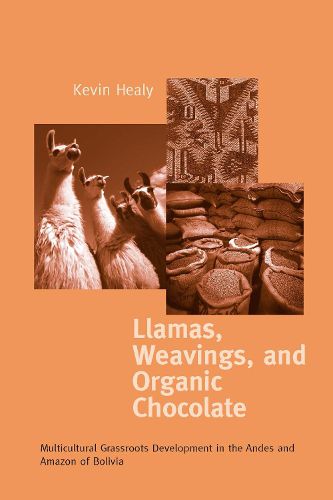Readings Newsletter
Become a Readings Member to make your shopping experience even easier.
Sign in or sign up for free!
You’re not far away from qualifying for FREE standard shipping within Australia
You’ve qualified for FREE standard shipping within Australia
The cart is loading…






This title is printed to order. This book may have been self-published. If so, we cannot guarantee the quality of the content. In the main most books will have gone through the editing process however some may not. We therefore suggest that you be aware of this before ordering this book. If in doubt check either the author or publisher’s details as we are unable to accept any returns unless they are faulty. Please contact us if you have any questions.
Bolivia, like most developing countries around the world, strove for decades to imitate Western and particularly U.S. methods of development, importing the latest technologies, institutions, crops, and livestock. Finally, beginning in the 1970s, faced with many striking instances of failure in the application of the North American modernization paradigm, diverse sectors of Bolivian civil society turned inward to rediscover their country’s own multicultural identities and agrarian wisdom as sources of strength upon which to build their own socioeconomic development. The shift spawned a proliferation of development projects grounded in a new indigenization or revitalization of cultural traditions. Llamas, Weavings, and Organic Chocolate: Multicultural Grassroots Development in the Andes and Amazon of Bolivia is the story of Bolivian rural development and cultural change. Part I provides an overview of the history of rural development in Bolivia-the long history of anti-indigenous discrimination, the introduction of aid programs in the Western development paradigm, the rise of grassroots movements challenging this paradigm, and the array of initiatives now contributing to the revitalization of indigenous cultural resources. Part II consists of in-depth narratives of nine projects, giving an inside view of the processes that interweave cultural recuperation and developmental strategies. These stories illustrate the cultural barriers that must be overcome and the setbacks often faced by grassroots federations. The projects range from successful agro-exports such as organic chocolate and quinoa to the groundbreaking work of indigenous artists and artisans. In Part III, author Kevin Healy attempts to identify the numerous factors that helped engender successful outcomes in these projects and discusses the effects of globalization on Bolivian culture and development patterns. This inspirational story of social change led by idealism will be valuable for international policymakers, analysts, and aid officials, as well as native North and South Americans, and non-Native Americans who strongly identify with their struggles.
$9.00 standard shipping within Australia
FREE standard shipping within Australia for orders over $100.00
Express & International shipping calculated at checkout
This title is printed to order. This book may have been self-published. If so, we cannot guarantee the quality of the content. In the main most books will have gone through the editing process however some may not. We therefore suggest that you be aware of this before ordering this book. If in doubt check either the author or publisher’s details as we are unable to accept any returns unless they are faulty. Please contact us if you have any questions.
Bolivia, like most developing countries around the world, strove for decades to imitate Western and particularly U.S. methods of development, importing the latest technologies, institutions, crops, and livestock. Finally, beginning in the 1970s, faced with many striking instances of failure in the application of the North American modernization paradigm, diverse sectors of Bolivian civil society turned inward to rediscover their country’s own multicultural identities and agrarian wisdom as sources of strength upon which to build their own socioeconomic development. The shift spawned a proliferation of development projects grounded in a new indigenization or revitalization of cultural traditions. Llamas, Weavings, and Organic Chocolate: Multicultural Grassroots Development in the Andes and Amazon of Bolivia is the story of Bolivian rural development and cultural change. Part I provides an overview of the history of rural development in Bolivia-the long history of anti-indigenous discrimination, the introduction of aid programs in the Western development paradigm, the rise of grassroots movements challenging this paradigm, and the array of initiatives now contributing to the revitalization of indigenous cultural resources. Part II consists of in-depth narratives of nine projects, giving an inside view of the processes that interweave cultural recuperation and developmental strategies. These stories illustrate the cultural barriers that must be overcome and the setbacks often faced by grassroots federations. The projects range from successful agro-exports such as organic chocolate and quinoa to the groundbreaking work of indigenous artists and artisans. In Part III, author Kevin Healy attempts to identify the numerous factors that helped engender successful outcomes in these projects and discusses the effects of globalization on Bolivian culture and development patterns. This inspirational story of social change led by idealism will be valuable for international policymakers, analysts, and aid officials, as well as native North and South Americans, and non-Native Americans who strongly identify with their struggles.